How to Use Music to Boost Productivity
- Happy & Authentic
- Continuous Learning, Emotions, Focus, Happiness, Mindfulness, Music, Physiology, Self-Development
- on Jul, 09, 2017
- 1 Comments
If you’ve watched my video about the power of music over our physical body and you’d like to learn simple ways to use music to make the most of your innate productivity, you’ve come to the right place.
If you haven’t watched the video yet, here it is below. In it, I explain how listening to music can increase your happiness as well as your health. Once you’ve watched the video, read the rest of this article to discover how to use music to your advantage just by following some simple tips.
Music held a very prestigious position in ancient times – every single culture had its own kind of music and used it for similar reasons, like appeasing or communing with the gods, inspiring courage during battle or making the enemy fear their prowess. These days we use music in slightly different ways, but once you know how to make the most of the benefits it has to offer, you can easily use it to your advantage, whether you’d like to relax or increase productivity.
We’re lucky because not only do we have a vast collection of different genres at our disposal on a moment’s notice, but we also have the science to understand how each song might affect us. So get out your notepad and get ready to learn how to maximize your musical potential by understanding how your brain understands and reacts to music...
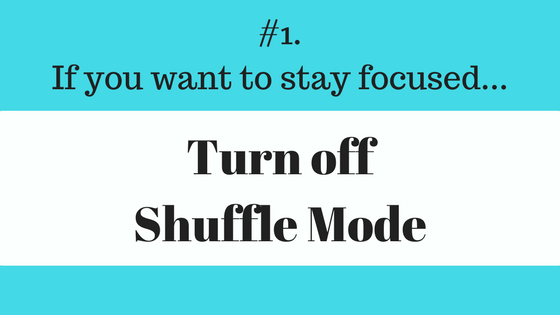
The human brain evolved to notice changes, no matter how small. It’s what kept us alert and alive in a time when predators lurked in ever shadow. These days this ability mostly just distracts us. So when your music is constantly changing – like when it’s on shuffle – your brain won’t tune it out. It will constantly grab your attention and keep you from being productive. So create playlists with similar songs that aren’t too dynamic, if your goal is to get absorbed in mental work. If it’s a workout or labour-intensive task, make sure the songs have a pulsating beat to them.
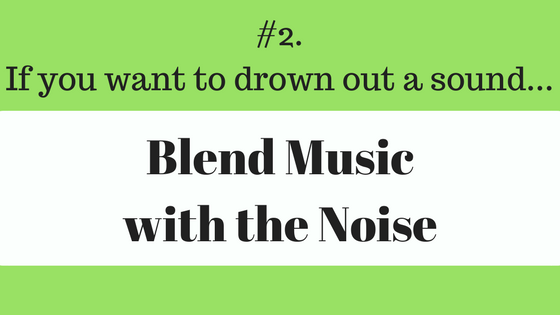
When your environment is noisy and irritating, adding louder drum and bass music will just intensify to your headache instead of relieve it. Sometimes the more you try to drown out the noise, the louder it all gets. And that’s just going to make it harder to concentrate on the task at hand. There are some types of minimalist music that can be used to complement whatever noise is bothering you and transform it from annoying to ambient. If your roommate is vacuuming, put on some nature sounds – perhaps some trees rustling in the wind. If your washing machine sounds like a jet fighter about to launch into the sky, put on some soothing waterfall sounds. You’d be surprised how some sounds have the power to absorb others and make them calmer.

Sometimes we need to do a task so recurring and monotonous that it becomes mind-numbing. Doing the same thing over and over again makes our brain switch off, because it isn’t learning anything new, which makes us less likely to be alert or engaged. Music can help us not only make the time go faster, but also make the task more enjoyable. This combined outcome results in more productivity. It can also help with fighting fatigue, especially if you switch up the music often during a long, boring task.
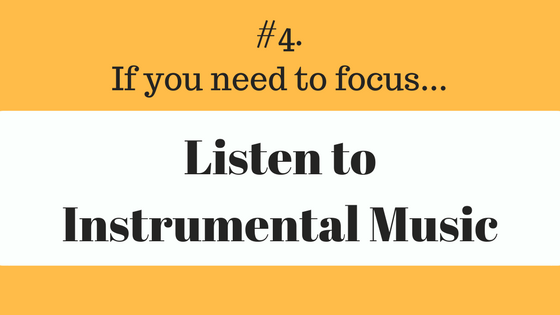
Even though multitasking is considered by some to be a virtue these days, there’s no denying the overwhelming evidence that the human brain can only focus on one thing at a time. Especially if that thing needs to be done well. I’m sure you’ve experienced trying to write an email while someone’s trying to have a conversation with you in real life. It usually results in you writing down what you’re saying (or hearing), and rarely ends with both tasks being handled at the optimal level. So don’t listen to music that has lyrics, if you are tackling a language-related task. Even if you’re not consciously listening to the words of the song, your brain is still processing them. that will take energy away from whatever you were supposed to be doing instead. So stick to instrumental music.

Classical music improves your accuracy of solving mathematical problems and spell-checking, compared to listening to no music at all.
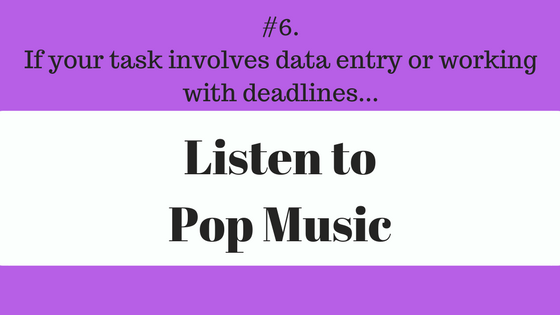
Pop music can help you complete data entry tasks faster than when listening to no music at all. It’s the best genre, alongside dance music, for producing fast results and cutting mistakes.
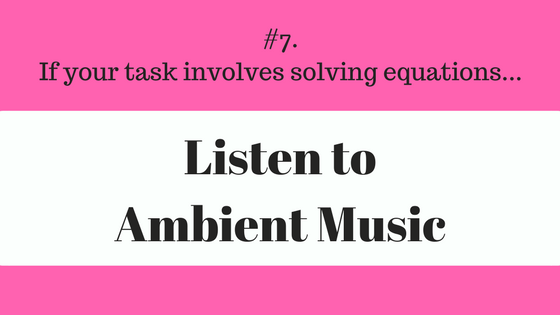
Ambient music is somehow both interesting and ignorable. It stimulates brain function without taking up mental resources and so leads to the highest level of accuracy when solving equations.
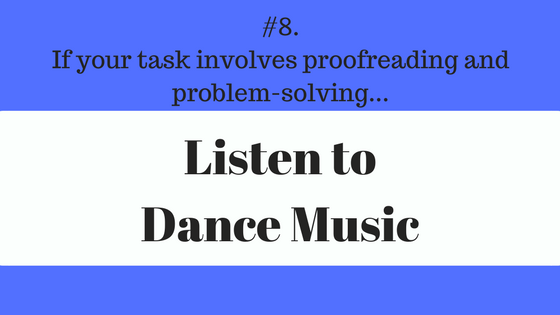
Dance music results in the highest overall accuracy and fastest performance across a range of work tasks. It allows you to complete abstract reasoning tasks faster than any other type of music and also helps you produce more accurate results in spell-checking, proof-reading, solving equations and tackling mathematical word problems.

Soft, mellow music with chill vibes (like house music, or nature sounds) can keep you at peace and concentrated while going over light topics for extended periods of time.

A song with a fast beat will keep your energy high. Your pulse and running speed will usually raise itself to match the beat of the song, so find one that matches how fast you’d like to go and follow it. Music can increase exercising strength by distracting attention off your physical discomfort and pushing your heart and muscles to work at a faster pace. The best music to listen to is between 120-140 beats per minute, which just happens to be the standard tempo for upbeat dance music.
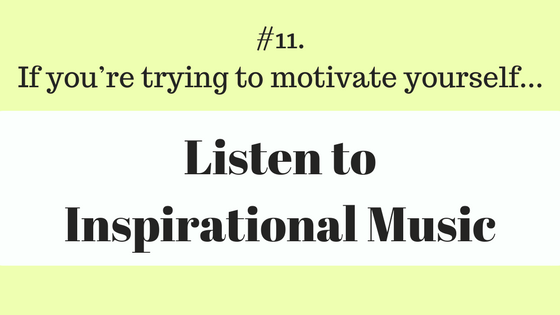
Inspirational songs that match the theme you’re going for can motivate you to do almost anything. There are songs to fit any situation nowadays, whether you’re looking for something to convince you you can win that race, or something that will encourage you during a difficult period of your life.

Songs can trigger memories and even restore cognitive function in Alzheimer’s patients and stroke victims. It stimulates the hippocampus, a region of the brain that stores long-term memories.
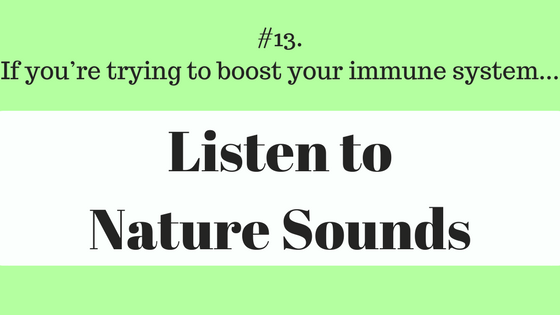
Listen to soothing music combined with nature sounds like flowing water and rustling trees can decrease cortisol levels, reduce inflammation and increase the amount of antibodies in your system.

Listening to a catchy, upbeat song can distract your brain from the fear of failure and allow you to focus on tasks you’ve already committed to memory. So if you’ve memorized your speech or have to perform a physical task you’ve been practising for ages, throw on some light-hearted music to shift gears back into autopilot and allow your basal ganglia (which help you perform tasks you’ve performed many times before) to take control from your prefrontal cortex (which makes you overthink things and panic under pressure).
Try out these tips and if you’re still finding this advice hard to implement, ask for help in the comments below, send me a message, or book a FREE breakthrough session to see how I can help you through Skype.
You can find more Happiness Strategy videos on my YouTube channel, so subscribe to make sure you never miss an episode! I come out with a new one every single Sunday.
Until next time, remember: Happiness doesn’t require energy. It requires Strategy.



Hi Happiness and Authentic Team,
I’m happy to inform you that this post is included in the recent part of TimeCamp’s weekly Productivity Articles roundup!
Thank you for sharing these excellent tips on how to improve productivity by listening to music!
Please find this recent episode here: https://www.timecamp.com/blog/index.php/2017/07/productivity-articles-9717/
Ola Rybacka, SM Manager at TimeCamp